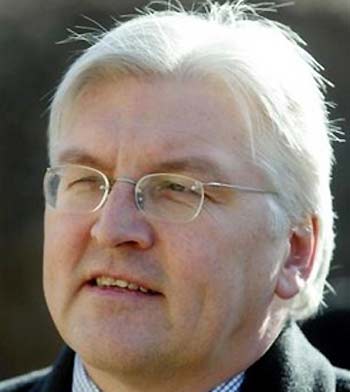|
Schroeder aide tapped as foreign minister
(AP)
Updated: 2005-10-14 10:42
A close associate of outgoing Chancellor Gerhard Schroeder was nominated
Thursday as the country's next foreign minister, raising questions about how
much Germany's conservative new leader will be able to mold foreign policy.
Frank Walter Steinmeier, Schroeder's chief of staff, was chosen by his party
colleagues for the post, one of eight selections the Social Democrats have in
the new Cabinet under a power-sharing deal with Chancellor-designate Angela
Merkel.
In other key choices, Social Democrat Peer Steinbrueck, the former governor
of North Rhine-Westphalia state, was nominated as finance minister to take
charge of the country's strapped state budget, while Social Democratic Party
chairman Franz Muentefering was selected for vice chancellor and labor minister.
Steinmeier, a 49-year-old lawyer, has been a low-profile but powerful figure
in Schroeder's government. It was his job to hear then-U.S. Ambassador Dan Coats
in a 2002 meeting express U.S. concerns about Schroeder's heated rhetoric
against the possibility of war in Iraq.
The choice of a close Schroeder associate as foreign minister underscores the
limits Merkel may face in putting her stamp on foreign policy. She has vowed to
reinvigorate ties with the United States frayed by Schroeder's opposition to the
Iraq war, and to place less emphasis on Schroeder's close partnership with
France.

Frank Walter Steinmeier, outgoing German Chancellor Gerhard
Schroeder's chief of staff, is seen in Berlin in this March 13, 2003 file
picture.[AP] | But she had to bargain away key ministries in order to get the Social
Democrats to join in a coalition and make her Germany's first female chancellor.
In a Sept. 21 speech, Steinmeier said the government's "clear public
positioning against the Iraq war" was one of its foreign policy achievements,
along with the diplomatic effort by Germany, France and Britain to persuade Iran
to give up its uranium enrichment program.
Schroeder has called for the new government to maintain his "independent"
foreign policy and back the use of force against terrorism only as a last resort
and with United Nations support, as with Germany's deployment of troops to
Afghanistan.
"That was decisive for us when we said 'yes' to fighting the terrorists in
Afghanistan ... and it must be decisive for us also in these coalition
negotiations in that we say we don't want to see any German soldiers in Iraq,"
Schroeder told a union conference Wednesday. "That must remain so."
Schroeder's Social Democrats lost last month's parliamentary elections to
Merkel's Christian Democratic Union. Merkel's preferred coalition with the
pro-business Free Democrats failed to win a majority, however, forcing Germany's
two largest parties to form a so-called "grand coalition."
The parties have agreed that the 16-member Cabinet will be divided equally
between them. The new government must be approved by party conventions after
negotiations, expected to last until Nov. 12. Lawmakers must then elect Merkel
in a vote in the new parliament.
Other choices for the ministries allocated to the Social Democrats included
Leipzig Mayor Wolfgang Tiefensee for the transport post and former Lower Saxony
Governor Sigmar Gabriel for the environment.
Three current ministers — Brigitte Zypries at the Justice Ministry, Ulla
Schmidt at the Health Ministry, and Heidemarie Wieczorek-Zeul at Development —
will keep their posts.
|